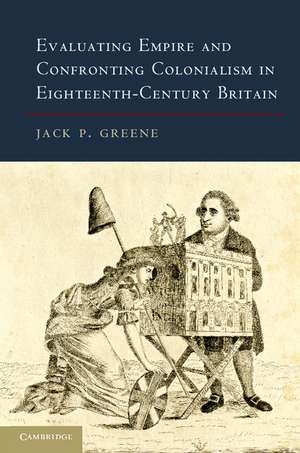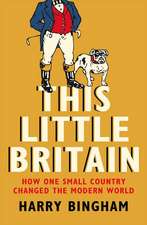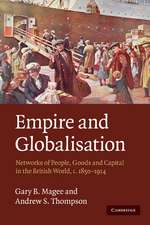Evaluating Empire and Confronting Colonialism in Eighteenth-Century Britain
Autor Jack P. Greeneen Limba Engleză Paperback – 28 mar 2013
| Toate formatele și edițiile | Preț | Express |
|---|---|---|
| Paperback (1) | 274.88 lei 6-8 săpt. | |
| Cambridge University Press – 28 mar 2013 | 274.88 lei 6-8 săpt. | |
| Hardback (1) | 645.26 lei 6-8 săpt. | |
| Cambridge University Press – 28 mar 2013 | 645.26 lei 6-8 săpt. |
Preț: 274.88 lei
Nou
Puncte Express: 412
Preț estimativ în valută:
52.61€ • 57.17$ • 44.23£
52.61€ • 57.17$ • 44.23£
Carte tipărită la comandă
Livrare economică 21 aprilie-05 mai
Preluare comenzi: 021 569.72.76
Specificații
ISBN-13: 9781107682986
ISBN-10: 1107682983
Pagini: 404
Dimensiuni: 153 x 235 x 22 mm
Greutate: 0.57 kg
Ediția:New.
Editura: Cambridge University Press
Colecția Cambridge University Press
Locul publicării:New York, United States
ISBN-10: 1107682983
Pagini: 404
Dimensiuni: 153 x 235 x 22 mm
Greutate: 0.57 kg
Ediția:New.
Editura: Cambridge University Press
Colecția Cambridge University Press
Locul publicării:New York, United States
Cuprins
1. 'The principal cornucopia of Great Britain's wealth': the languages of commerce, liberty, security, and maritime supremacy and the celebration of empire; 2. Outposts of 'loose vagrant people': the language of alterity in the evaluation of empire; 3. 'A fabric at once the dread and wonder of the world': the languages of imperial grandeur, liberty, commerce, humanity, and justice and the American challenge to empire; 4. Arenas of 'Asiatic plunder': the languages of humanity and justice and the excesses of empire in India; 5. Sites of Creolean despotism: the languages of humanity and justice and the critique of colonial slavery and the African slave trade; 6. 'A fruitless, bloody, wasting war': the languages of imperial grandeur. Liberty, humanity, and commerce in the American conflict; 7. 'This voraginous gulph of Hibernian dependence': the languages of oppression, corruption, justice, liberty, and humanity and the identification of imperial excesses in Ireland; 8. A 'shadow of our former glory'?: The discussion of empire in the wake of American secession; 9. Epilogue: 'against every principle of justice, humanity, and whatever is allowed to be right among mankind': standards of humanity and the evaluation of empire.
Recenzii
'Groundbreaking … One cannot imagine anyone failing to profit from immersing themselves in (these) elegantly written pages.(Greene) has opened up a subject and a debate on anti-colonialism in the British Empire which is likely to be with us for a long time to come.' History Today
'Greene offers a series of case studies of imperial issues in America, Africa, the Caribbean, Ireland, and India between the 1760s and 1790s … It provides an important context with which to understand early America …' Andrew J. O'Shaughnessy, Journal of American History
'An important book on a topic to which historians have not given due attention. Greene has done nothing short of opening up a new subfield of eighteenth-century imperial history. No doubt rich harvests will follow.' Max M. Edling, The Journal of Southern History
'Greene offers a series of case studies of imperial issues in America, Africa, the Caribbean, Ireland, and India between the 1760s and 1790s … It provides an important context with which to understand early America …' Andrew J. O'Shaughnessy, Journal of American History
'An important book on a topic to which historians have not given due attention. Greene has done nothing short of opening up a new subfield of eighteenth-century imperial history. No doubt rich harvests will follow.' Max M. Edling, The Journal of Southern History
Notă biografică
Descriere
This book analyzes how Britons celebrated and critiqued their empire during the short eighteenth century, from about 1730 to 1790.












